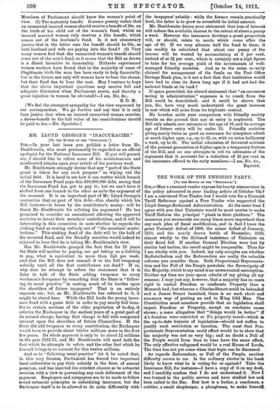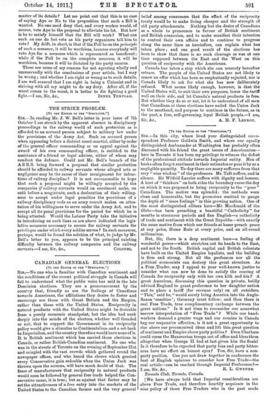THE WORK OF THE ITNIONIST PARTY.
[To THE EDITOR 07 THE "SPECTATOR.")
SIR,—May a constant reader express his hearty concurrence in the policy advocated in your leading article of October 7th ? I am a convinced Free Trader, but I would vote for a Unionist Tariff Reformer against a Free Trader who supported the Lloyd George-Redmond Administration. At the same time I agree with you that Unionists would be most unwise to make Tariff Reform the principal "plank in their platform." The measures you enumerate are many times more important than any such plan of fiscal modification, and in fact I trace the great Unionist defeat of 1906, the minor defeat of January, 1910, and the nearly drawn battle of December, 1910, almost wholly to the ill-timed insistence of Unionists on their fiscal fad. If another General Election were lost by similar bad tactics, the result might be irreparable. Thus far I am wholly with you. Indeed, my only scruples are whether Redistribution and the Referendum are really the valuable reforms you consider them. Both Proportional Representa- tion and the Poll of the People postulate the Sovereignty of the Majority, which to my mind is an unwarranted assumption. Neither my time nor your space admits of my giving all my reasons ; I may just say, however, that a majority has no more right to curtail Freedom or confiscate Property than a Monarch had ; but whereas a Charles Stuart could be beheaded and a James Stuart banished, there is no such short and summary way of putting an end to King Odd Man. The Constitution must somehow provide that no legislation shall impair Freedom or Property, except on conclusive cause shown ; a mere allegation that "things would be better" if A's freedom were restricted or Z's property taxed—which is the up-to-date keynote of legislation—should not suffice to justify such restriction or taxation. The most that Pro- portionate Representation could effect would be to show that the majority was not so very big ; and no doubt a Poll of the People would from time to time have the same effect. The only effective safeguard would be a real House of Lords. The time has not yet come when that topic can be discussed.
As regards Referendum, or Poll of the People, another difficulty occurs to me. Is the ordinary elector in the least likely to know what he is voting for or against? Take the Insurance Bill, for instance—I have a copy of it on my desk, and I candidly confess that I do not understand it. Now I was trained in the public service and have studied law and been called to the Bar. But how is a butler, a coachman, a cobbler, a small shopkeeper, a ploughman, to make himself, master of its details ? Let me point out that this is no case of saying Aye or No to the proposition that such a Bill is wanted. No one need deny that, and every worker would, of course, vote Aye to the proposal to alleviate his lot. But how is he to satisfy himself that the Bill will work ? What can such an one do but vote as his party organizers tell him to vote ? My drift, in short, is that if the Poll be on the principle of such a measure, it will be worthless, because everybody will vote Aye for a measure which is represented as beneficent; while if the Poll be on the complete measure, it will be worthless, because it will be dictated by the party caucus.
These are some of my reasons for not agreeing wholly and unreservedly with the conclusions of your article, but I may be wrong ; and whether I am right or wrong as to such details, I am well assured that I am right in being a Unionist and in striving with all my might to do my duty. After all, if the worst comes to the worst, it is better to die fighting a good



















































 Previous page
Previous page